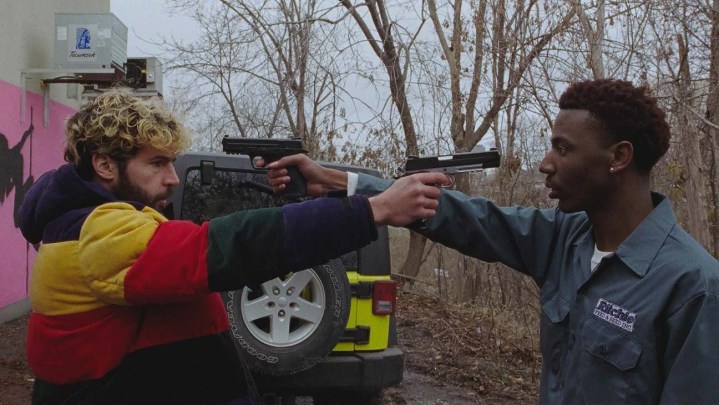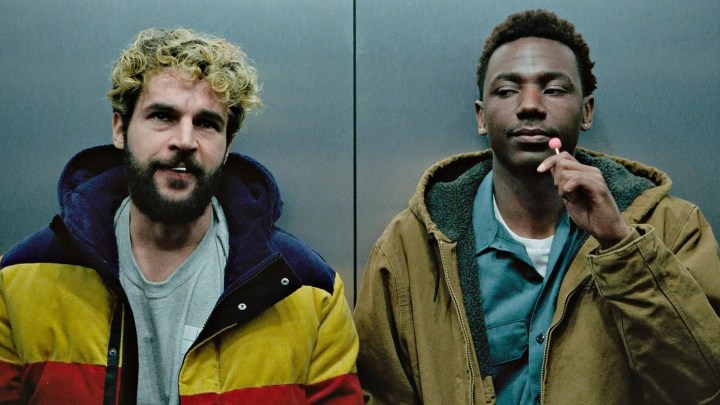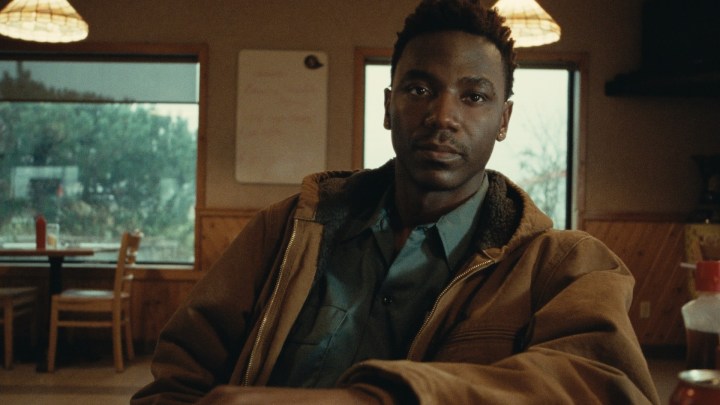On the Count of Three isn’t your typical, run-of-the-mill buddy movie. The lead protagonists, Val and Kevin, are both committed to killing themselves in 24 hours, and want to settle old conflicts that led them to their fatal decision. Yet what sounds like a serious drama is also one of the best comedies of the year, and that’s largely due to the great screenplay by Ari Katcher and Ryan Welch.
In a conversation with Digital Trends, both writers talk about collaborating with star Jerrod Carmichael, how they approached blending comedy with drama, and what they want viewers to get out of the film.
Digital Trends: How did On the Count of Three come about?
Ari Katcher: I was working on The Carmichael Show with Jerrod. Ryan and I were writing some things on the side, and we had an idea for a movie with Jerrod in mind. We ran it by him, he liked it, and we just wrote it. We started showing it around to people and seeing who liked it.

How long did it take to write the screenplay?
Ryan Welch: It was a pretty long process of writing it, putting it down, rewriting it, putting it down again. We were working on the script even as we were shooting the film. I don’t know if you had it at all, how much we were actually working on it, but.
Katcher: I’m trying to think of how long the initial draft took to write. I actually have no recollection of how long that took. That time period was kind of a blur.
Can you describe your collaboration process with Jerrod? How did it differ from how you work with him on The Carmichael Show?
Katcher: For the film, the process was pretty different than working on the show. The Carmichael Show was based on real conversations that he’d have with his parents. A lot of times when we’d be writing scripts, we’d actually just call his parents way too late in the night and just be like, “Hey, mom, I had a gun in high school. What do you think about that?” And then we’d get her reaction so that we could put it in the show. A lot of times, the things that she would say in response to him saying some crazy shit would be exactly what the dialog should be in the show.
Jerrod was involved in every step of the writing for The Carmichael Show, but for the On the Count of Three, we’d talk out the idea, and then Ryan and I would go off and write a thing and then present it to him. He’d then have great thoughts on what we’d write. Yeah, I guess it’s a fairly different process.

Was there a lot of improv on his part for this movie?
Katcher: Not really. It’s not really a riffy type of film. I think a lot of the comedy comes from situations that they’re in. There are a few lines here and there that were kind of improvised.
Welch: I would say probably most of the work happened before we were shooting and making sure the actors were comfortable with it. But in terms of when the cameras rolled, it was pretty faithful to the script.
Katcher: We were in too much in a time restraint to improvise completely off the script.
On the Count of Three has some dark themes, but it’s also pretty funny. As writers, how do you toe that line between drama and comedy? Because if you go overboard with the comedy, you can make light of some serious stuff.
Welch: I think part of it is just being honest in how you feel. When you’re trying to be funny and that’s the only goal, it doesn’t hit because you’re not being honest about what you’re feeling. You’re just trying to get a laugh. Are you actually communicating what you’re feeling in your heart? And I think if you stay true to that, if you’re being honest, I think you can be funny and dramatic and hopefully find that balance.
Katcher: You almost don’t want to overthink it. If you go into it being like “Oh, I really want this drama to work, so I can only have three jokes in this scene,” you got to ask yourself if it feels right. Does that joke feel like not what that person would say at that moment? And if so, then you got it. No matter how much you like that joke, you got to realize that it’s not worth it. It’s not worth it to step on the belief that that character is real and wouldn’t say that.

In the movie, there’s kind of a subtle running commentary about gun control. What was the intention there? Was it just to sort of poke fun at the absurdity of the situation and Kevin, who seems to be very liberal, but also brandishes a gun and feels power from it?
Katcher: I think it is kind of all those things. Jerrod, Ryan, and I, it’s something that we all relate to a lot. Ryan and I both grew up in Anchorage, Alaska, I lived in New York for a little while and now live in L.A., so I’ve seen a lot of pretty diverse opinions about [gun control]. I feel like I kind of understand where all of them are coming from.
Welch: It was like a little bit less like making a statement about guns as writers and more like trying to find the fun within the character about what he believes and then what he is confronted with in the movie. You never try to make a message with the movie. That always feels pretty gross. So it’s more about staying within the character rather than making an overt statement.
At one point in the film, Kevin says it hurts to be ignored. The film is very empathetic to people like him who have been marginalized. What do you want viewers to take away from this film after they’ve watched it?
Katcher: Whatever they get from it, they get from it, and I think that’s that is okay. Although one thing I did feel yesterday while watching it is that when you are in a dark place, the thing that sometimes does jolt you out of that is that reminder of freedom, that feeling of like, “Oh, yeah, I can go do anything right now.” And that’s usually the thing that jolts me out of it.
I think that’s something that the characters do find in that story is they’re both at this pretty hopeless place, but then you go see them and they just decided to randomly ride dirt bikes. When you see that, you think “I can go out and do something that makes me feel alive.” You know, I can go move to L.A. and try to make it. I can go confront my father. I can go right on a dirt bike. There are little things that you can do to make yourself feel alive.
On the Count of Three is currently in theatres and available on digital platforms.



